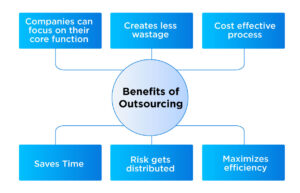Outsourcing is a key tactic for companies looking to save expenses and increase efficiency.
Businesses might gain from specialized knowledge and cost savings by assigning particular work to other firms while concentrating on their primary business operations. By hiring different companies to offer semi-finished or finished products and services, firms may more efficiently manage resources and simplify processes.
This blog will explain the idea of outsourcing, its benefits, and how it works in the business sector, offering insights into why it has grown in popularity among organizations worldwide. Let’s get started!
What is Outsourcing?
Generally, when businesses hire third parties to complete some of their tasks, either related to a product or service, then that process of hiring a third party to do specific work is known as outsourcing. It provides partially finished or finished goods or services to the firm.
Why Do Businesses Outsource?
It is a money-saving way of doing business. It saves time, for sure. If done in a proper way, it maximizes the efficiency of the business. It helps higher management authorities to focus their time and energy on several other important tasks.
When businesses outsource their work to a third party, they grow in an effective way. So, it helps in the enlargement of the business. This togetherness brings more profit and initiates new good bonds.
How Does Outsourcing Work in Business?
Companies that provide outsourcing services establish themselves in such a way that they can do the required task at a minimum cost. If we consider firms based in countries like India, China, or the Philippines, they have a low cost of living. Therefore, they provide the same services at minimum cost as Western countries.
When companies outsource their work, some of their tasks get done faster and more efficiently. So, they can give attention to the other important tasks. This also ensures that management people focus their knowledge and skills on necessary and essential tasks. One benefit is that firms that hire third parties for their tasks will get quality work because outsourcing firms have expertise in their field.
Additionally, if a company wants to grow its business by building it in different countries, then outsourcing is cost-effective. Hence, in less time and with minimum money, one can build one's business. One thing to note is that outsourced work is of several types. It is as easy as data entry or as difficult as network design. It completely relies on the business type.
To this point, we discussed the task completion part. However, when firms outsource, they must maintain good bonds with each other. Rather good business relationships lead to successful give and take, which brings prosperity to both the parties. It is more difficult to maintain and secure a relationship of trust than it is to build service standards and partnerships yet maintaining them is important for outsourcing initiatives.
The other side is contract and agreement. Certain experts advise paying particular attention to a service contract's separation provision. Businesses must be aware of when a contractual arrangement will unavoidably expire in order to make sure that all parties involved fulfill the end of the agreement and remain on board until the end of the contract.
Example of Outsourcing in Business
A little tech startup outsourcing its cybersecurity needs to a professional outfit is a perfect example of this concept.
The startup hires a cybersecurity firm to track and safeguard its digital assets rather than developing an internal staff. Because of this, the business may benefit from modern security measures and specialized expertise without paying the substantial expenses of hiring and sustaining an internal cybersecurity staff.
Through this strategy, the firm can concentrate on creating its core goods and services while ensuring strong protection.
Benefits of Outsourcing
- Companies can focus on their core function
- Creates less wastage
- Cost-effective process
- Saves Time
- Maximizes efficiency
- Risk gets distributed
The Bottom Line!
Outsourcing has several benefits that may have a big influence on the productivity and expansion of a company. Through the utilization of specialist organizations' skills, businesses may save expenses, increase efficiency, and concentrate on their primary tasks.
Adopting outsourcing might result in a company model that is more robust and dynamic, ready to change with the possibilities and needs of the market.
We explained the concept of outsourcing in business through this blog content with the hope that it will resolve some of your doubts and help grow your business.
To get more knowledgeable content and insights, go through our website blogs at KnowledgeNile.
Read More:






